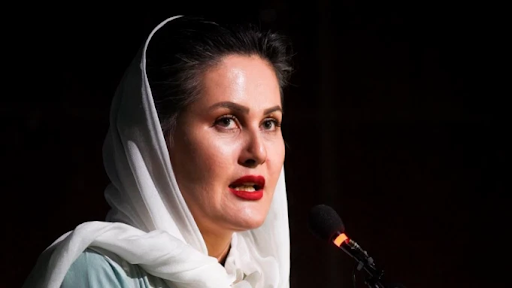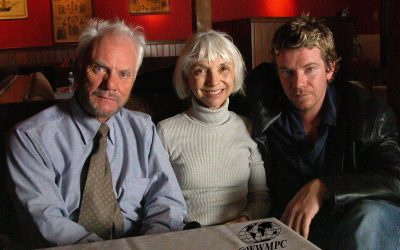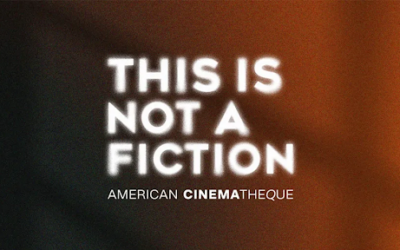Source: The Hollywood Reporter
Although the primary objective of most film festivals is for the viewing of the cinematic works chosen to be included, such events can also hold a number of panels and discussions in which filmmakers are allowed to speak about their experiences and the making of such films. The Venice Film Festival is one such event to exhibit both film screenings and live discussions, and the latest occurrence of this revered and long-running festival, taking place between September 1st and September 11th, will continue this trend. On top of screening a wide selection of films both feature-length and short, there will also be a wide variety of panels in which directors, actors, and numerous other individuals involved with the production of films will take the stage and discuss what went into the creation of their respective works. One panel in particular, however, is expected to stand out above all others, if only because of current international events and their effect on specific filmmakers.
On Saturday, August 28th, organizers of the Venice Film Festival announced that it will hold a panel in which directors from the nation of Afghanistan, which had recently been taken control of by the Taliban, will discuss the current situation surrounding their homeland and how it is impacting their ability to create cinema. Among the most prominent filmmakers to speak at the panel are Sahraa Karimi, director of “Hava, Maryam, Ayesha” (which had previously been screened as part of the Horizons program of the 2019 Venice Film Festival), and Sahra Mani, the documentarian behind the film “A Thousand Girls Like Me”. Moderated by Italian journalist Giuliano Battison, well known for his coverage of the Afghanistan conflict in 2007, the panel is set to take place on September 4th at 3 pm local time, and will also include European Film Academy executive director Wouter Knol, as well as representatives of the International Coalition of Filmmakers at Risk (ICFR), as speakers.
According to the statement released by Venice, the panel will be primarily concerned with the current crisis and how the Taliban takeover will directly impact the nation’s population, especially its artists. Getting artists out of the country before they become directly threatened by the re-emerging Taliban government is the biggest priority for those holding and speaking at the panel, and those involved hope that the discussion will further encourage European governments to provide asylum for those attempting to flee Afghanistan. A suicide bombing near the nation’s capital Kabul served as a grave reminder of the danger being posed to the Afghan populace, and with United States troops set to be fully evacuated from the nation by the end of August, the people of Afghanistan are at greater risk than ever, and as much support as possible, the panel speakers claim, will be needed to get them all to safety.
Karimi, who also serves as the head of Afghan Film, the nation’s official filmmaking group, was one of the fortunate individuals who had managed to get out of Afghanistan, boarding a flight to Istanbul, Turkey on August 17th, mere days after the Taliban had seized control of Kabul. Much of Karimi’s work since has been mainly focused on getting other families out as safely and quickly as she was able to; in an interview with The Hollywood Reporter (conducted through the WhatsApp messaging app from the city of Kyiv, Ukraine, where she currently takes refuge), Karimi claims to have so far gotten several of her colleagues and their families out of Afghanistan, with the Ukrainian and Slovakian governments (Karimi herself has Slovak citizenship as a result of her education in Bratislava) proving especially helpful in her progress so far. Such progress is not enough though, and much more work will need to be done in order to get more people out of Afghanistan.
One person whom Karimi is especially concerned for is one of the actresses she worked with on her film “Hava, Maryam, Ayesha” (withholding her name for the sake of the actress’ personal safety). “[She] was coming to the airport yesterday when the bombs went off,” Karimi explains. “She got away, she’s safe. But she can’t get out that way now.” Although she wasn’t willing to go into much detail (simply citing the whole situation as “pure chaos”), Karimi claims that more secretive means of getting her actress and crew members out of the country are being explored, means that will hopefully ensure the safety of as many people as possible.
On top of everything else going on in Afghanistan at the moment, Karimi is especially concerned about how much the Taliban will double down on censorship of the films produced in the nation, if not the complete shutdown of the industry altogether. Although none of the female filmmakers working for Afghan Film were fired (at least at the time of the interview), they had all been told to stay home for the time being, and Karimi is worried that the situation will only get worse, especially considering how little information is being given to her. “The Taliban have refused to speak to me at all, even though I’m head of Afghan Film,” Karimi states, “I was kicked out of our [WhatApp] workgroup then when I asked why they re-instated me. I’ve asked if I’m still in charge, if I should return, but no answer.”
All of these concerns, as well as several others that relate to the plight of Afghan filmmakers, are expected to be brought up at the panel set to take place on September 4th. With the situation in Afghanistan getting worse with each day, Karimi and her fellow panel speakers hope to use their platform to further emphasize these issues and stress the importance of getting its people to safety. Even though she herself has managed to find refuge in Europe, Karimi has yet to show any signs of stopping, with this upcoming panel being one of her many efforts to advocate for the safety of her fellow Afghan refugees and the future of the art she has built much of her life around.
“We cannot let the world forget,” Karimi says. “Or it will be the end of Afghan cinema.”




